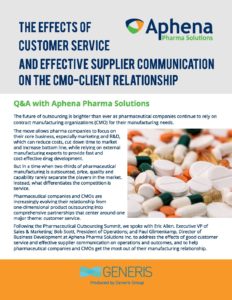Q&A with Aphena Pharma Solutions
The future of outsourcing is brighter than ever as pharmaceutical companies continue to rely on contract manufacturing organizations (CMOs) for their manufacturing needs.
This move allows pharma companies to focus on their core business, especially marketing and R&D, which can reduce costs, cut down time-to-market, and increase bottom line, while relying on external manufacturing experts to provide fast and cost-effective drug development.
But in a time when two-thirds of pharmaceutical manufacturing is outsourced, price, quality and capability rarely separate the players in the market. Instead, what differentiates the competition is service.
Pharmaceutical companies and CMOs are increasingly evolving their relationship from one-dimensional product outsourcing into comprehensive partnerships that center around one major theme: customer service.
Following the American Pharma Outsourcing Summit 2018, we spoke with Eric Allen, Executive VP of Sales & Marketing; Bob Scott, President of Operations; and Paul Glintenkamp, Director of Business Development at Aphena Pharma Solutions to address the effects of good customer service and effective supplier communication on operations and outcomes, and to help pharmaceutical companies and CMOs get the most out of their manufacturing relationship.
Questions discussed:
- What are the issues that arise from selecting a contract manufacturing company that does not invest in a culture of client communication?
- How will the level of communication offered by a contract manufacturer change the efficiency, outcomes and/or operations of a pharmaceutical company for the better?
- When it comes to communication, what should pharmaceutical companies expect from their suppliers?
- During the supplier selection process, how can a pharmaceutical company assess the level of service and communication offered by contract manufacturers? How can they identify organizations with a client communication-oriented culture?
- What steps does Aphena take to ensure the highest level of accountability and client communication?
- What has been the resulting outcome for your clients since implementing Project Interact?
- Once in a partnership, what are the practical steps that pharmaceutical companies can take to uphold their end of the communication bargain?
Click through to access the Q&A here.

%20(1).png?width=773&height=112&name=Generis%20Logo%20full%20Colour%20(Large)%20(1).png)

.png)
-2.png)
